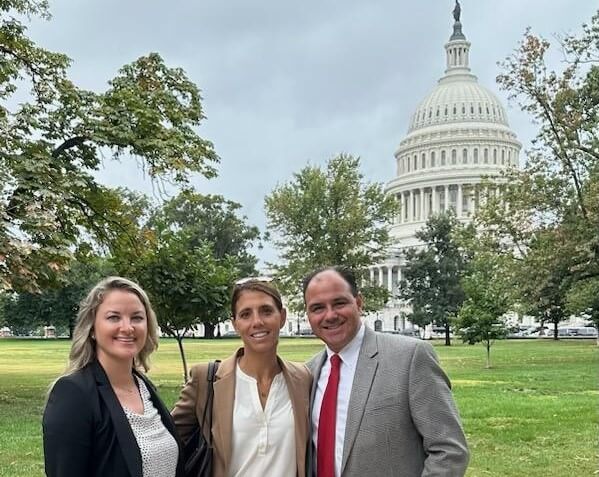CSCAA Makes Wave of Impact on Capitol Hill Advocating for College Swimming: ‘The March Will Go Forward’

CSCAA Makes Wave of Impact on Capitol Hill Advocating for College Swimming: ‘The March Will Go Forward’
The mission was simple: Get the word out to the most influential people in the country.
The College Swimming & Diving Coaches Association of America (CSCAA) spoke to many U.S. senators and representatives on Capitol Hill this week to spread the word on the tough road facing Olympics sports in wake of the NCAA vs. House bill.
But it wasn’t a hearing or a panel, Executive Director Samantha Barany along with current president Arthur Albiero and past president Mandy Commons-DiSalle, got three days of one-on-one discussions with national officials.
“It was a relationship building and education providing mission by the CSCAA,” Barany said. “The meetings were to discuss the impact of what the NCAA vs. House bill means and the unintended consequences that will occur if athletes are labeled as employees.”
It was part of a coordinated effort with seven Olympic sports as the group got to meet with between 70-80 representatives and senators about the issues.
“The bottom line is college athletics needs congressional help in order for the model to have help moving forward productively,” Barany said. “The impact could be devastating.”
Barany discussed the trickle down and trickle up effects of a world without the same collegiate swimming and diving system.
“If college swimming and diving does not exist, it will have an impact directly on youth swimming and diving. That impact will be profound on the sport locally to globally,” she said. “It is a multi-faceted issue.
We believe that athletes and coaches do not want to be employees. I haven’t heard of one athlete that wants that, because of all the unintentional consequences. We are not against NIL or athletes gaining more revenue or sponsorship because that was the real reason for NIL. We need to make sure the same protections are given to all sports.”
The CSCAA trio discussed different aspects of the issue with different officials. The one-on-one format of the meetings allowed for personalized discussions with each person.
“The one-on-one meetings were really advantageous because every office you go to has a different priority. The Olympics will be in California next and so politicians from there have a different perspective on it than someone from upstate New York, who might have more of an opinion on Division II and Division III schools,” Barany said. “The people of Washington were able to get to the highest level of college officials, but what they weren’t getting was the voice of the coaches and athletes. Having Mandi and Arthur in the room to really explain the day in a life of a student athlete on campus and what is vulnerable was really impactful.”
Overall, Barany said the meetings went well, and there will be more in the future.
“This is a long game. It has been already for many years, but it still is. But the education we provided to senators and congressmen is mission critical,” she said. “They are dealing with a lot of things and issues, so they are dedicating 30 minutes to us which is big.
“This was the first of what we expect to be several meetings. If we didn’t do this, it would have been a massive miss. The alternative is to sit idle and the CSCAA cannot sit idle because we know the impact will be huge.
“We need all major stakeholders to get together and do something. We will make a second round of visits in early 2025. The march will go forward.”



